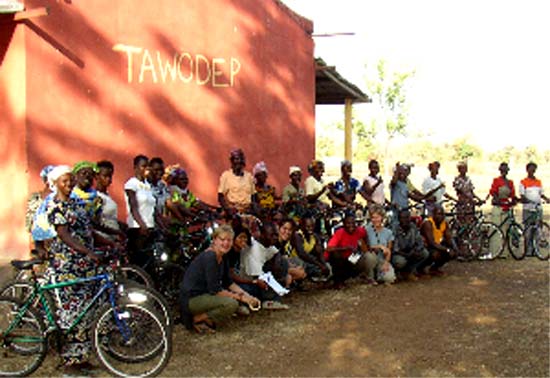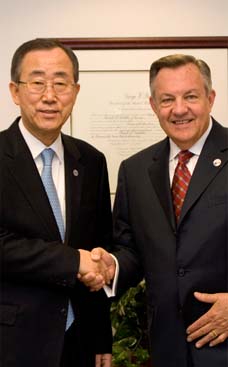
We don’t give things away. 100% charity disrupts markets, which runs counter to values of sustainability. Gifting promotes the culture of dependence, devalues the goods and services, and is a magnet for corruption and deceit. Things that are freely given are freely wasted. The VBP approach lowers the bar of access to bicycles, giving access to a wider spectrum of the hard-working but disadvantaged poor. At the risk of sounding a bit Darwinian, if we gave bikes away to society’s losers, what would that do for the general impression of bikes? Instead, by making bikes more affordable, they become more associated with success, and psychologically more attractive. In the eight years we've been working, nearly 3000 Ghanaians have gotten basic repair training along with discounted bikes, in more than 60 communities (90% rural) throughout the country. We've imported about 17,000 donated used bikes from US and UK, and subsidized $16,000 worth of tools to Ghana and its neighbors. VBP claims our success on a number of factors. Key is that our program managers are Ghanaian bicycle business members who know the local nuance of bike repair, workings of supply, economic culture, etc, in ways that would take a lifetime for an outsider to learn. Their's is a business relationship with the US-based non-profit. For them, the fact that they are helping their fellow Ghanaians and traveling all over the country are added perks to their vocation. Essential to our rural outreach is our relationship with Peace Corps Volunteers, who serve as hosts to our village programs. PCVs share our vision of clean rural mobility and poverty reduction and have the relative objectivity to shield our programs from the corruption that is rampant in poor countries.
Congo Kinshasa, Ivory coast, and Gabon RPCV David Peckham has shipped over 17,000 bicylces to Ghana with the Village Bicycle Project
Sustaining Bicycles as Desirable Rural Transport
by David Peckham
The women of Talensi Area Women’s Development (TAWODEP)and their new bikes, January 26, 2007. In front are trainers, organizers and assistantsBicycles can serve an important role for rural mobility and poverty alleviation in the less-developed world, where public transportation is scarce and motorized personal vehicles are far too costly for the average person. In some places bikes already move significant amounts of people and produce, as in China, Vietnam and Uganda. There, a vast network of bikes, parts, and repair capability reaches far from the urban centers to the remotest areas. The result is that over a wide area bikes are low cost, reliable and easy to repair. In much of Africa, however a weak supply infrastructure keeps bikes prohibitively expensive.
Village Bicycle Project has been working in Ghana to make bikes more affordable since 1999. We focus in three specific areas; supplying bicycles and parts, bike tools and repair education. In rural areas repair training is coupled with discounted bikes (half-price), effectively making bikes available to a poorer people while empowering them to better take care of their bikes.
At the same time, in the urban center we're increasing the supply of bikes and parts, and more importantly subsidizing tools. Tools like the freewheel remover, crank puller, chain breaker and allen keys -- virtually unknown in Ghana before VBP -- significantly improve the ability of bike mechanics to make basic repairs, leading to increased repair confidence, bikes in better condition, and increased income, which encourages more people to enter into the trade. In short, we're building the capacity of the bicycle business to sustain bikes as desirable rural transport. Sustainability of rural transport improvements depends to a considerable extent on the ability of the urban center to supply replacements bikes and parts, and repair know-how.
In the eight years we've been working, nearly 3000 Ghanaians have gotten basic repair training along with discounted bikes, in more than 60 communities (90% rural) throughout the country. We've imported about 17,000 donated used bikes from US and UK, and subsidized $16,000 worth of tools to Ghana and its neighbors.
VBP claims our success on a number of factors. Key is that our program managers are Ghanaian bicycle business members who know the local nuance of bike repair, workings of supply, economic culture, etc, in ways that would take a lifetime for an outsider to learn. Their's is a business relationship with the US-based non-profit. For them, the fact that they are helping their fellow Ghanaians and traveling all over the country are added perks to their vocation.
Essential to our rural outreach is our relationship with Peace Corps Volunteers, who serve as hosts to our village programs. PCVs share our vision of clean rural mobility and poverty reduction and have the relative objectivity to shield our programs from the corruption that is rampant in poor countries.
It is also significant that we work with the market system. We don't give things away. 100% charity disrupts markets, which runs counter to values of sustainability. Gifting promotes the culture of dependence, devalues the goods and services, and is a magnet for corruption and deceit. Things that are freely given are freely wasted. The VBP approach lowers the bar of access to bicycles, giving access to a wider spectrum of the hard-working but disadvantaged poor. At the risk of sounding a bit Darwinian, if we gave bikes away to society's losers, what would that do for the general impression of bikes? Instead, by making bikes more affordable, they become more associated with success, and psychologically more attractive.
Also important is the fact that Ghana removed import duties on bikes in the mid 90s. The government was serious about helping the poor and understood that bikes do help. Some African countries regard bikes as recreational toys, charging as much as 100% tariff.
As rigid gender roles commonly exclude women from the benefits of development, it is essential that bicycle projects specifically include and involve women. VBP is helping overcome the stigma against women cycling in southern Ghana, where women on bikes is rare. In 2006 we started a program focused on women, and assisted 40 women to get bikes through our women's programs that year, and 40 more in the first month of 2007.
We have dozens of stories about how our bikes are helping people. Cobbinah Amensah used to spend nearly 50% of his salary getting to his job in town from his home village. Now he bikes halfway, and saved the cost of his bike in three months. Emily Panu, a teacher earns $45 a month. Her family helped her pay for her bike, and if she rides to work every day saves $18 a month in fares. Ben Onyamiema is a farmer who earns cash by doing carpentry work. His customer base has nearly tripled since he got his bike, as he is able to take jobs in neighboring villages. Schoolteachers Ernest Tokutsoe and Alex Sewornu, both received their bikes four years ago in one of our workshops, and they are still riding them to work daily.
The Village Bicycle Project model for making bikes more accessible to rural people should be replicable in many places around the world. The combination of bikes, parts, tools, repair ed and inclusion of women builds the overall capacity of the supply system. If you can find reliable people already working in the bike business, use Peace Corps and other reputable NGOs to help with rural outreach, and work within the local market pricing, bikes can sustatinably become more affordable to rural people around the world.
This opinion piece was contributed by David Peckham, Village Bicycle Project, Ghana.













